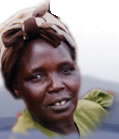 |
 |
||
 |
|||
|
RELATED THEMES conflict politics OTHER LOCAL THEMES BACKGROUND |
history
One narrator talks about the Second World War and how some Sabaot participated: "Some were not lucky to come back. But many of them came back with money. People who were originally poor were able to buy livestock.. The Second World War gave us an opportunity to send people out to other communities so that they could see how other people do their things. [It] opened up the eye of our people." (Kenya 15) Participation in the liberation struggle, he says, was more difficult, because "the Kikuyu who were the leaders of the struggle were not allowed by the whites to interact with other communities." But one prominent member of the struggle visited the area and "I hosted him in my own home and slaughtered a goat for him." "The community generally understood independence as freedom," he went on, ".although I must admit that not many people, including myself, believed that independence would happen as it did. I never imagined that the white man would ever leave this country." quotes about history"...the word Elgon comes from the word Kony, which is one of the big clans in the Sabaot community. This also goes a long way to show that we've been living here for a long time." "It is said the original father of the Sabaot people was called Kingo. He had four sons...It is also said that at one time these sons broke a gourd belonging to their father, and because their father was very harsh, he banished them from their home. Some went down to Bungoma, others went to different areas, and each one of them, wherever they went, formed the main clans of the Sabaot community." ".by the time the [white settlers] reached the Sabaot, they had already seen the Maasai. When he met the Sabaot, he was surprised to meet people who had the same lifestyle as the Maasai. He looked at our homesteads, our cattle sheds, our mode of dressing and even the way we carried out things like circumcision, and concluded that he had encountered another group of the Maasai on the slopes of Mount Elgon. [So he] started referring to us as the Elgon Maasai..." |
|
 Historical references are mainly about how the Sabaot came to inhabit Mount Elgon and the long-term conflict with the Bukusu. Several narrators have clear memories of life under colonial rule, and the fight for independence. They describe how things changed after independence. Many highlight their exploitation by white settlers and the loss of land, but more than one paints a positive picture of the colonialists, and several feel that white oppression was exchanged for worse oppression by the Bukusu. Some feel the settlers supported the Bukusu, and so increased Sabaot vunerability to Bukusu dominance. Several remember missionaries introducing Christianity and education, and the unease many felt about the threat this posed to their culture.
Historical references are mainly about how the Sabaot came to inhabit Mount Elgon and the long-term conflict with the Bukusu. Several narrators have clear memories of life under colonial rule, and the fight for independence. They describe how things changed after independence. Many highlight their exploitation by white settlers and the loss of land, but more than one paints a positive picture of the colonialists, and several feel that white oppression was exchanged for worse oppression by the Bukusu. Some feel the settlers supported the Bukusu, and so increased Sabaot vunerability to Bukusu dominance. Several remember missionaries introducing Christianity and education, and the unease many felt about the threat this posed to their culture.